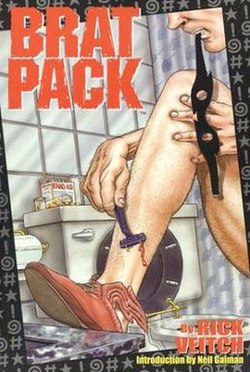Brat Pack (comics)
| Brat Pack | |
|---|---|

Cover of the 2003 Brat Pack trade paperback.
Art by Rick Veitch. |
|
| Publication information | |
| Publisher | King Hell Press |
| Schedule | Monthly |
| Format | Limited series |
| Genre | |
| Publication date(s) | August 1990 – May 1991 |
| No. of issues | 5 |
| Main character(s) |
Black October:
|
| Creative team | |
| Created by | Rick Veitch |
| Written by | Rick Veitch |
| Artist(s) | Rick Veitch |
| Letterer(s) | Gary Fields |
| Collected editions | |
| Brat Pack: Heroes From Hell | ISBN |
Black October:
Brat Pack is the title of a comic book limited series by Rick Veitch (self-published under the company name King Hell Press). It is a dark satire on superhero sidekicks, influenced partly by the fans' decision to kill off Batman's sidekick Jason Todd, but also built on other long-standing rumors and undercurrents in the history of the superhero genre, prominently commercialism, homosexuality, pedophilia, violence, and the fascist tendencies inherent in superheroes.
Brat Pack was released as a limited series in 1990–1991.
The events of Brat Pack take place in the fictional city of Slumburg, Pennsylvania. The plot involves the efforts of Slumberg's various heroes, known collectively as Black October, to recruit new sidekicks—the original group of sidekicks having been killed by the villain Doctor Blasphemy.
Underlying the plot is the recurring element of the heroes being aware of their public popularity and the success of the comic books and merchandise based on their lives and adventures. Neil Gaiman characterizes Brat Pack's pastiche of cynical commercialism this way: "The corporations, after all, own the characters. Remember: Batman isn't simply a comics character: he's a movie star, a lunchbox pin-up, a licensing goldmine. You mess with Batman and Warner Entertainment gets worried. You screw with Spider-Man, and watch Revlon get upset."
The main characters of Brat Pack are:
The initial 1992 trade paperback collection of the limited series features notable differences from the original, most prominently in the ending. Since then, there have been four subsequent collected editions (with comics writer Neil Gaiman adding an introduction to the third and all subsequent releases).
...
Wikipedia
